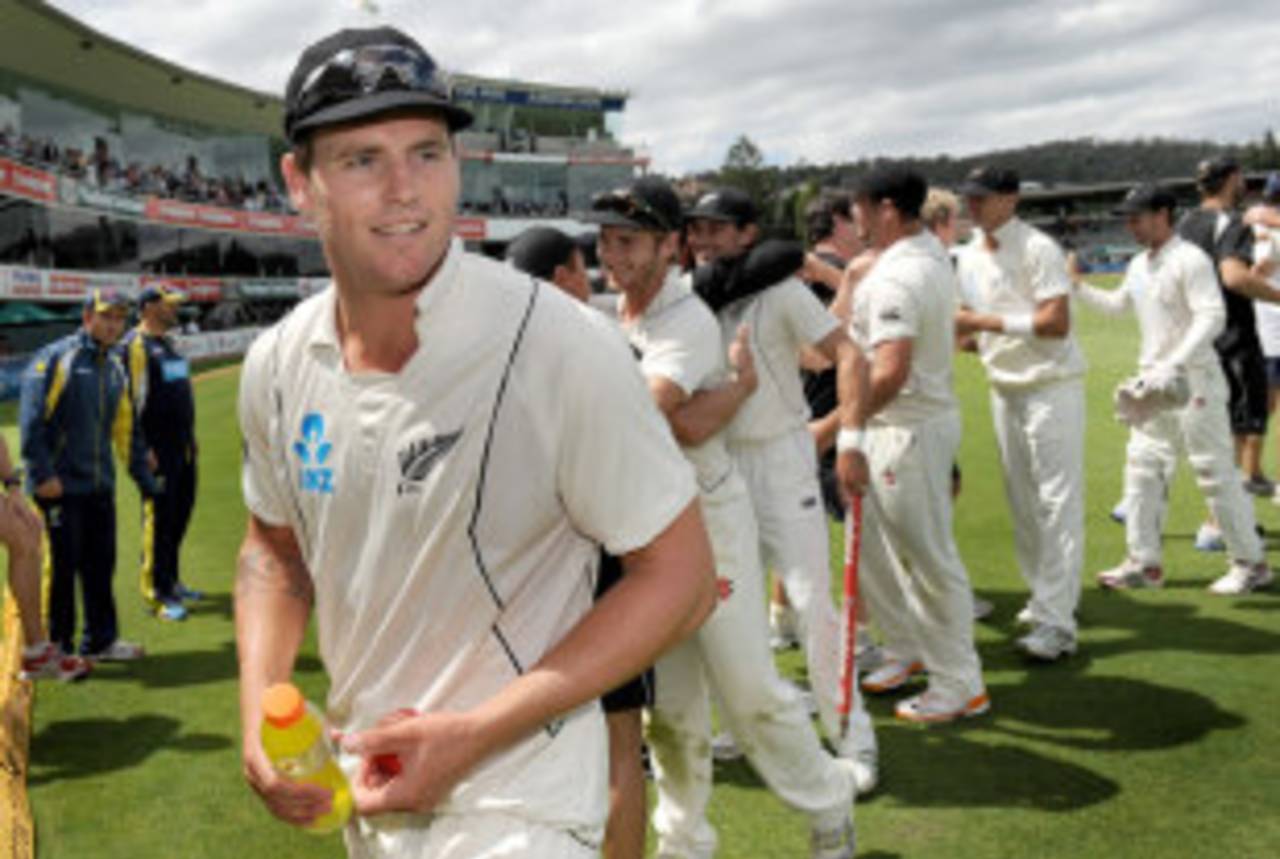The great Man-of-the-Match debate after the
Hobart Test … my first reaction when I watched it live was a bit of surprise. I would probably have gone for
Doug Bracewell but could see why the judges chose
David Warner. Once it dawned on me that it was a viewer-driven poll, though, I was less sanguine about the decision. "How stupid," I thought. Of course it was only ever going to go one way if that was the way it was decided. My next thought was, "Honestly, who really cares?"
Clearly, I'm in the minority. Clearly, lots of people do care. So let's look at both sides of the argument then.
This MOM award thing is such a fine line. Especially in such a close game. If this Test had been played in New Zealand, with the same viewer voting system in place, no prizes for guessing who would have won that award. Even if Warner had got Australia over the line, Bracewell may have won the vote. I don't think Australians are the only folk who would have voted for their own man in a tight call.
Let's look at it another way; in Hobart, if Warner hadn't taken that last single, exposing Nathan Lyon to the strike and smashed two boundaries instead (if anyone in world cricket is capable of doing that, surely Warner would be close to the top of that list), would that have changed everything? It would have meant that Australia would have won the match, Warner would have scored a few more runs and Bracewell would have taken five wickets instead of six in a losing cause. So, would eight extra runs have changed our opinion on the whole matter?
What if it wasn't Warner who hit those extra eight runs? What if Lyon had snicked a couple of boundaries or even played one of those delightful Mark Waugh-esque flicks through midwicket? Would that have made us less critical of the popularity contest verdict?
My point is that in a game that was so close, it was a marginal call anyway as to who would get the MOM award. Personally, I would have chosen Bracewell but it wasn't the 'no-brainer' that some people suggest it was. After all, here was a bloke in only his second Test, often pilloried for being a Twenty20 slogger, carrying his bat through a tense fourth-innings chase on a pitch where the next-highest individual score was less than half his 123. It was a pitch that suited bowlers after all so perhaps, if you wanted to be devil's advocate, it could be argued that Warner's effort was more meritorious than Bracewell's bag of wickets.
Do the players themselves really care all that much? Sure, we remember the MOM from a World Cup final but do we really remember each Test match award? It's only a temporary title after all. The circus moves on and today's MOM is yesterday's forgotten hero. How many cricketers trade their reputations on official MOM awards? They play so much cricket these days and each award ceremony is nothing more than an attempt by sponsors to get some gormless, star-struck chief executive or marketing manager on stage to hand over some hideous looking trophy or gold-plated carving. The compere asks the player insightful questions like "how do you feel?", the player responds by thanking the sponsors and acknowledging the contribution of "the rest of the lads" and another memorable (not) ceremony winds up with a mug shot of the aforementioned chief executive trying to shake the hands of anyone who had anything to do with the match, including the groundsman, umpire or bus driver.
Real cricketers don't really care about these awards, not to the extent that the public seems to anyway. Cricketers are not like politicians who care more about what other people outside their 'industry' think. To cricketers at this level, the respect of their peers is more important than any award. Bracewell knows that he has the respect of his team-mates and more importantly perhaps, he has earned a new level of respect from the Australian team. That's probably his most satisfying emotion - knowing the opposition team rates him. MOM awards are all very good but honestly, they'd trade all of those awards for that deep sense of respect and being rated by the opposition. Cricket at this level doesn't need titles to confer legitimacy. Their achievements transcend such cheap thrills.
Cricketers tend to value quiet respect and admiration from inside their community much more than popularity contests conducted by mobile phone companies who make money from every vote. Warner, clearly crestfallen at losing the match, should be applauded for not whooping it up when he got the award. The Australian team were dignified in not going over the top when handed the Chappell-Hadlee Trophy. The New Zealand side were dignified and gracious in victory, aware that in young Bracewell, they had a champion of the future. Dignity, respect and a quiet sense of a job well done. No need for anything else.
Michael Jeh is an Oxford Blue who played first-class cricket, and a Playing Member of the MCC. He lives in Brisbane
